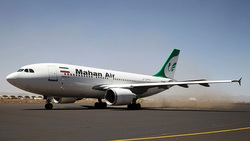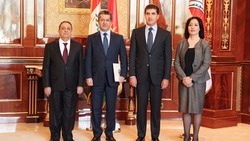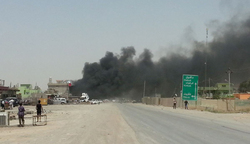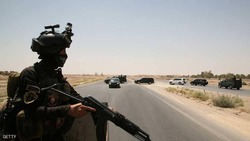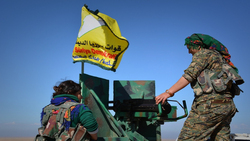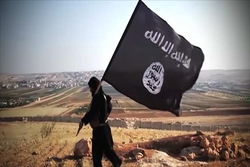Report: Putting Kurds in spotlight, Iran's leaders try to deflect national protest
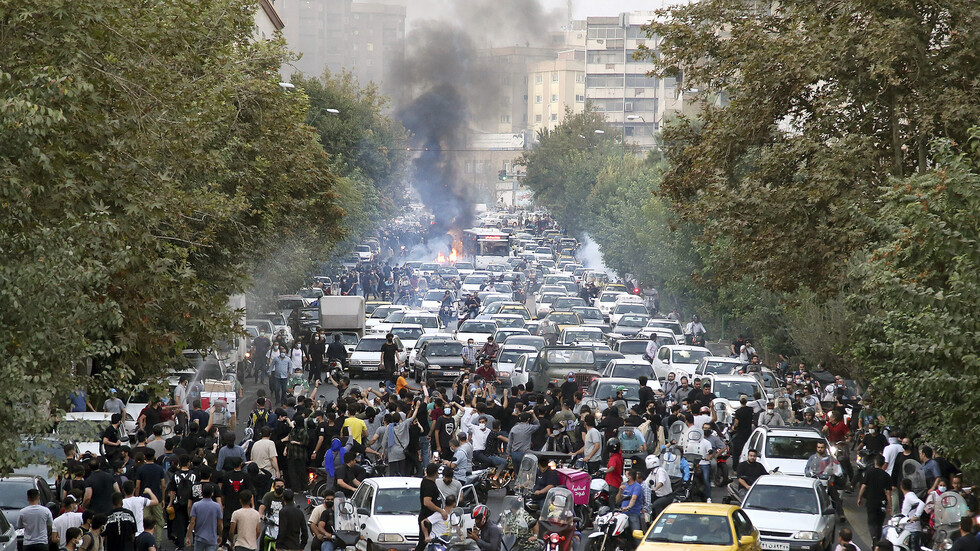
Shafaq News / Facing their biggest challenge in years, Iran’s religious leaders are trying to portray the angry protests over the death of Mahsa Amini as a breakaway uprising by her fellow Kurds threatening the nation’s unity rather than its clerical rule.
Amini, a 22-year-old from Kurdistan province in northwest Iran, died in the custody of the Islamic Republic’s morality police after she was detained for violating strict codes requiring women to dress modestly in public.
Protests which started at Amini’s funeral in her Kurdish hometown of Saqez spread rapidly across the country, to the capital Tehran, cities in central Iran, and the southwest and southeast where Arab and Baluch minorities are concentrated.
Across the country, including at universities and high schools, the rallying cry “Women, Life, Freedom” and the same calls for the downfall of Supreme Leader Ayatollah Ali Khamenei were heard, yet much of the crackdown by security forces focused on the northwest where most of Iran’s estimated 10 million Kurds live.
Riot police and Basij paramilitary forces have been transferred to the area from other provinces, according to witnesses, and tanks were sent to Kurdish areas where tensions have been particularly high.
Iran has also attacked Iranian Kurdish armed groups in neighbouring Iraq it says are involved in the unrest. Iran’s Revolutionary Guards fired missiles and drones at militant targets in northern Iraq’s semi-autonomous Kurdish region, where authorities said 13 people were killed.
“The Kurdish opposition groups are using Amini’s case as an excuse to reach their decades-long goal of separating Kurdistan from Iran, but they will not succeed,” a hardline security official said.
His comments were echoed by a former official, who told Reuters senior security officers were concerned that “the support Kurdish people are getting from across Iran will be used by Kurdish opposition groups to push for independence.”
Iranian state media have called the nationwide protests a “political plot” ignited by Kurdish separatist groups, particularly the Kurdistan Democratic Party of Iran (KDPI).
“Since the very start of the uprising the regime has tried to portray it as a Kurdish ethnic issue rather than a national one, invoking a separatist threat emerging from the Kurdish region,” said Ali Fathollah-Nejad, a political scientist at the American University of Beirut.
Those efforts by authorities had been undermined, Fathollah-Nejad said, by significant solidarity between Iran’s different ethnic groups during the nationwide protests.
Still, looking across their border to Iraq, and further west to Syria, Iranian authorities can point to Kurdish ambitions for self-rule taking root when central government was challenged.
In Iraq, Kurds who for years fought Saddam Hussein won enough Western military protection after the 1991 Gulf War to establish a degree of autonomy, which was strengthened when Saddam was toppled 12 years later in a U.S.-led invasion.
Syrian Kurdish forces also exploited the tumult of the 2011 uprising against President Bashar al-Assad, allying with the United States against Islamic State and carving out a swathe of northeast Syria under their control.
In Turkey, where around a fifth of the 85 million-strong population is Kurdish, Kurdistan Workers Party (PKK) militants have fought an armed insurgency against the state since 1984 in which tens of thousands of people have died.
In Iraq and Syria, Kurds have demonstrated in solidarity with the protesters in Iran. In Turkey, a deputy leader of the pro-Kurdish Peoples’ Democratic Party told Reuters the party “salutes the women in Iran” calling for their rights.
“As in Turkey, Iraq and Syria, in Iran it is the Kurds who seek democracy, the Kurds who seek freedom,” said Tuncer Bakirhan, a former mayor who was removed from his post and jailed over alleged militant ties.
Reuters could not immediately reach Iranian officials for comment, but the government routinely denies allegations that it discriminates against any ethnic groups in its population and says all citizens regardless of ethnicity are treated equally.
Iran’s constitution grants equal rights to all ethnic minorities and says minority languages may be used in the media and schools. But rights groups and activists say Kurds face discrimination along with other religious and ethnic minorities under the country’s Shi’ite Muslim clerical establishment.
Amnesty International has reported that “scores if not hundreds” of political prisoners affiliated to the Kurdish group KDPI and other proscribed political parties are in jail after being convicted in unfair trials.
“The regime has never recognised the rights of its Kurdish population,” said Hiwa Molania, a Kurdish Iranian journalist based in Turkey.
Despite those restrictions at home, and the examples of Kurdish autonomy in Iraq and Syria, many Iranian Kurds insist they are not seeking secession.
“Iranian Kurds want their constitutional rights to be respected,” said Kaveh Ghoreishi, an Iranian Kurd journalist and researcher. “People in the Kurdistan province… want a regime change and not independence.”
Ali Vaez, senior Iran analyst at the International Crisis Group, said accusations of Kurdish separatist ambitions aim to create a “rally around the flag effect” that encourages Iranians to support the leadership rather than the protesters.
However, the real danger was not any breakaway ambitions of Iran’s minorities, but their treatment by Iran’s leadership.
The Systematic disregard for the legitimate grievances of ethnic and sectarian minorities … have rendered the country increasingly vulnerable to the civil strife that has pulled countries in the region like Syria and Yemen into a deadly downward spiral,” Vaez said.
(euronews)
